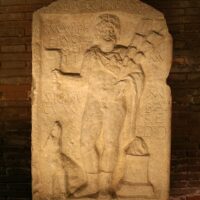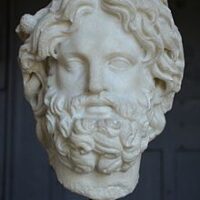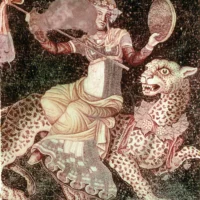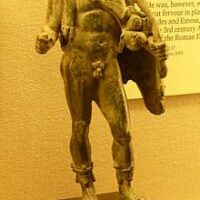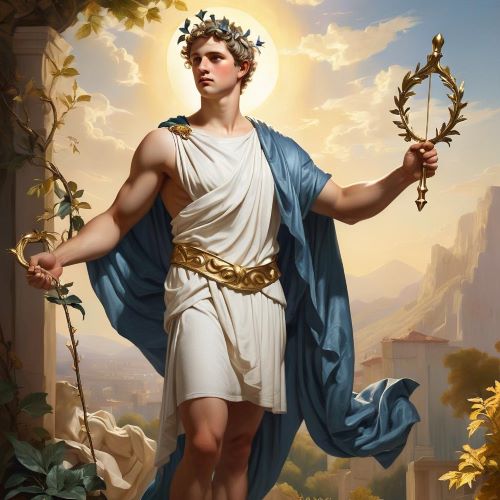Silvanus : God of Forests
Listen
At a glance
| Description | |
|---|---|
| Origin | Roman Mythology |
| Classification | Gods |
| Family Members | N/A |
| Region | Italy |
| Associated With | Woodlands, Forests, Wildlife |
Silvanus
Introduction
Silvanus, a significant deity in Roman mythology, is revered as the god of forests, fields, and the natural world. Originally seen as a spirit embodying the wild woodlands, he evolved into a divine protector of the countryside, overseeing forests, agricultural lands, and cattle. Silvanus symbolizes the balance between nature and humanity, playing a crucial role in rural life by safeguarding cultivation and preservation efforts. He is closely associated with local spirits known as Silvani, who manage specific areas and tasks within nature.
His mythology often highlights interactions with mortals, particularly in tales of unrequited love involving figures like Cyparissus and Pomona, showcasing his more whimsical side. Typically depicted in rustic attire, Silvanus is linked with symbols such as the falx (a sickle) and the cypress tree, both underscoring his deep connection to the natural world.
The origins of Silvanus can be traced back to the Etruscan god Selvanus, indicating a shared reverence for nature among these ancient cultures. The name Silvanus, meaning “of the woods” in Latin, reflects his role as a guardian of forests, uncultivated lands, and field boundaries. In ancient Rome, he was particularly important to farmers, shepherds, and others who depended on the abundance of nature for their livelihood.
Physical Traits
In Roman art, Silvanus is typically depicted as an aged, bearded man, embodying the wisdom and timeless essence of the woodlands he protects. His attire, often in earthy tones, blends seamlessly with the natural environment, highlighting his role as a guardian of the wild. However, his appearance is not limited to this form; Silvanus can also be envisioned in various other guises. For example, he might appear as a youthful figure dressed in leaf armor and wielding a wooden mallet, symbolizing his role as a protector of forests. Another depiction presents him as the Horned Hunter, a silent entity with antlers, shaggy fur, and glowing eyes, embodying the fierce guardian of wildlife. These diverse portrayals emphasize both the gentle and formidable aspects of the wild that Silvanus represents.
Silvanus is also occasionally shown as a centaur, a towering figure symbolizing the spirit of the wilderness, further underscoring his deep connection to nature’s dual nature of ferocity and nurturing. Statues and reliefs often depict him as a robust, rustic figure, sometimes adorned with garlands of flowers or leaves, reflecting his bond with the natural world. He is frequently shown holding a pruning knife or axe, tools symbolizing his role as the caretaker and protector of forests. His rugged appearance and simple clothing capture the untamed wilderness he oversees, conveying an air of mystery and the raw power of the natural world.
Family
The family lineage of Silvanus remains somewhat obscure, with ancient texts offering limited details about his origins. He is often seen as an independent deity, without clearly defined parentage, which aligns with his role as a god of untamed, uncultivated lands. While his connections to other gods are not deeply elaborated, Silvanus is sometimes linked to Mars, suggesting a parallel between their attributes—Mars governing war and conflict, while Silvanus oversees the natural world. This association with Mars, often referred to as “Mars Silvanus,” implies a connection to forest warfare techniques, highlighting a martial aspect within Silvanus’s domain.
Silvanus also holds a place in folk religion, where he is frequently associated with the Lares, the household gods who protect family and home. This connection underscores his role not only as a guardian of the wilderness but also as a protector of domestic life. Additionally, Silvanus is closely related to other nature deities, such as Faunus, the god of forests and fields, and Pomona, the goddess of fruit trees. These deities share similar attributes and responsibilities, and their worship is often intertwined with Roman religious practices.
Despite not being part of the major Roman pantheon, Silvanus occupies a unique niche as a deity of the countryside, distinct in his role yet interconnected with other nature gods. His identity is further solidified by his distinct duties, which set him apart within Roman mythology.
Other names
Silvanus is known by various names and forms across different cultural and linguistic contexts. His name originates from the Latin word *silva*, meaning “forest,” highlighting his role as the deity of the wild. This root has led to several related names in different languages, including Silvius, Silas, Sylas, Sylvain, and Silvano. These variations reflect phonetic and cultural adaptations while retaining a connection to his dominion over nature.
In literature and fantasy settings, Silvanus is sometimes associated with characters like Skerrit, who embodies themes of nature conservation and druidic practices. This association underscores the widespread representation of nature in various cultural contexts and the lasting influence of Silvanus as a symbol of the natural world.
Additionally, Silvanus was occasionally known by titles such as “Silvanus Invicto” (Silvanus the Invincible), which highlights his power and protective role. In Etruscan mythology, a similar deity named Selvans exists. Although the direct influence of Selvans on Silvanus is unclear, both deities share a protective connection to nature and agricultural activities.
Powers and Abilities
Silvanus, as the god of nature, wields a range of powers that reflect his role as the guardian and nurturer of the natural world. He embodies the natural cycle, overseeing the interplay between growth and decay, and life and death. His followers receive various enhancements, such as the ability to heal and mend wounds, which align with his protective nature. Devotees often gain heightened senses, allowing them to perceive subtle environmental changes and strengthen their connection to nature.
In fantasy settings like Dungeons & Dragons, Silvanus grants his followers spells that mirror his control over the natural world. These include *Barkskin*, which fortifies the skin for protection, and *Entangle*, which creates thorny vines to trap enemies. Spells such as *Speak with Animals* facilitate communication with wildlife, promoting harmony and understanding between humans and forest creatures. His teachings encourage respect for ecosystems, guiding his followers to champion environmental conservation and protection.
Beyond his offensive and defensive capabilities, Silvanus’s powers also encompass the nurturing aspects of nature. He is invoked to safeguard crops, livestock, and rural communities, ensuring their prosperity. Silvanus is associated with land fertility and tree growth, and he is known to bless those who honor him. He protects cattle herds from predators and maintains field boundaries. His love for music is represented by the syrinx, a sacred instrument. Silvanus’s attributes suggest possible connections with other woodland deities such as Pan, Faunus, Inuus, and Aegipan.
Modern Day Influence
Silvanus’s legacy continues to thrive in modern contexts, especially within fantasy literature and role-playing games like Dungeons & Dragons. In these settings, he is depicted as a revered deity whose influence shapes characters’ actions and beliefs. As the Father of the Forest and protector of nature, Silvanus’s role aligns with contemporary environmental advocacy, promoting principles that resonate with modern conservation efforts. The Church of Silvanus, featured in these narratives, reflects real-world movements aimed at sustainable practices and preserving natural habitats, thereby bridging ancient reverence with current environmental concerns.
Moreover, Silvanus has made a significant impact in audiovisual media, where his image symbolizes the untamed wilderness. Organizations and initiatives often invoke his name or imagery to raise awareness about environmental issues, highlighting his enduring status as a guardian of forests and ecosystems. This ongoing representation underscores his role in fostering a sense of environmental stewardship, encouraging communities to recognize their responsibilities toward nature and maintain a balance between human activities and the natural world.
In Roman society, Silvanus was an important deity, particularly in rural areas where his influence was closely tied to agricultural practices and the seasonal cycle. Farmers would make offerings to him for successful harvests, protection of crops, and the well-being of livestock. His worship was integral to rural life, emphasizing his role in ensuring agricultural prosperity and the overall health of rural communities.
The cult of Silvanus was widespread across the Roman Empire, with dedicated shrines and temples often located in forests or near agricultural settlements. Festivals and sacrifices were held to honor him, reflecting his significance among farmers and those living close to nature. In literature and art, Silvanus is portrayed as a rustic figure associated with trees, animals, and the countryside. Despite the decline of his direct worship, his essence persists in the appreciation of nature, illustrating the timeless relevance of his principles in balancing cultivated lands with the wilderness.
Related Images
Frequently Asked Questions
What is lorem Ipsum?
I am text block. Click edit button to change this text. Lorem ipsum dolor sit amet, consectetur adipiscing elit. Ut elit tellus, luctus nec ullamcorper mattis, pulvinar dapibus leo.
What is lorem Ipsum?
I am text block. Click edit button to change this text. Lorem ipsum dolor sit amet, consectetur adipiscing elit. Ut elit tellus, luctus nec ullamcorper mattis, pulvinar dapibus leo.
What is lorem Ipsum?
I am text block. Click edit button to change this text. Lorem ipsum dolor sit amet, consectetur adipiscing elit. Ut elit tellus, luctus nec ullamcorper mattis, pulvinar dapibus leo.
What is lorem Ipsum?
I am text block. Click edit button to change this text. Lorem ipsum dolor sit amet, consectetur adipiscing elit. Ut elit tellus, luctus nec ullamcorper mattis, pulvinar dapibus leo.
What is lorem Ipsum?
I am text block. Click edit button to change this text. Lorem ipsum dolor sit amet, consectetur adipiscing elit. Ut elit tellus, luctus nec ullamcorper mattis, pulvinar dapibus leo.


